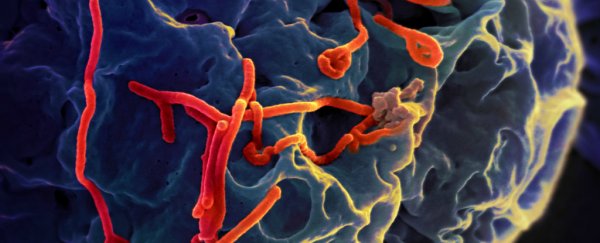Genetic tests have confirmed that a Liberian woman contracted Ebola in March after having sex with a survivor of the disease.
Even though it was known that Ebola could survive in semen for weeks after a patient's symptoms had cleared up, this is the first time it's been confirmed that the disease can be transmitted sexually - and it also show that the virus can persist in bodily fluids a lot longer than we ever suspected.
The couple in question had unprotected sex six months after the man was first infected with Ebola, and 155 days after a blood test declared that he was clear of the virus - well past the 90 days that the virus was previously assumed to survive in bodily fluids, and that survivors are currently told to abstain from sex.
But analysis has shown that not only were the genomes of the man's and woman's virus virtually genetically identical, they were also different from all other Western African Ebola viruses that had been sequenced.
The researchers also ruled out that contact with other infected people could have transmitted the virus to the woman - in fact, she caught the disease 30 days after Liberia had been declared Ebola-free.
The results are published in the New England Journal of Medicine, alongside a preliminary report that suggests Ebola's genetic material can persist in semen an incredible nine months after infection.
Combined, the two papers show that we still have a lot to learn about how Ebola spreads, and just how long it takes to declare someone clear of the virus.
But the good news is that even though we now know sexual transmission is possible, the epidemiological evidence so far suggests that it can't be very common. There are more than 17,000 people who have survived the West African Ebola outbreak, and yet fewer than 20 suspected incidences of sexually transmitted infection have been reported.
"If sexual transmission from survivors were an important means of disease propagation, we would have seen a number of cases by now," wrote Armand Sprecher from Doctors Without Borders in Brussels, who wasn't involved in the research, in an opinion piece accompanying the research.
He also urges people not to use this research as further reason to stigmatise survivors of the virus.
"Let us not forget that survivors have already endured a painful severe illness, and many emerge from it to find that friends and family members have died," he writes. "If they are then treated as pariahs and threats, we add a terrible unkindness on top of their suffering. They should be treated with all the compassion we can muster."
Still, it's a significant breakthrough in our understanding of this persistent and deadly virus, and with further research it will help scientists develop safer guidelines and better protection in communities affected by the disease.
"It's a really exciting article … Ebola is a really complex and fascinating virus and we keep discovering new things about it every day," Jeremy Farrar, Director of the Wellcome Trust, who didn't work on the study, said in a statement. "The take home message from this article it's not over when we think it's over."
